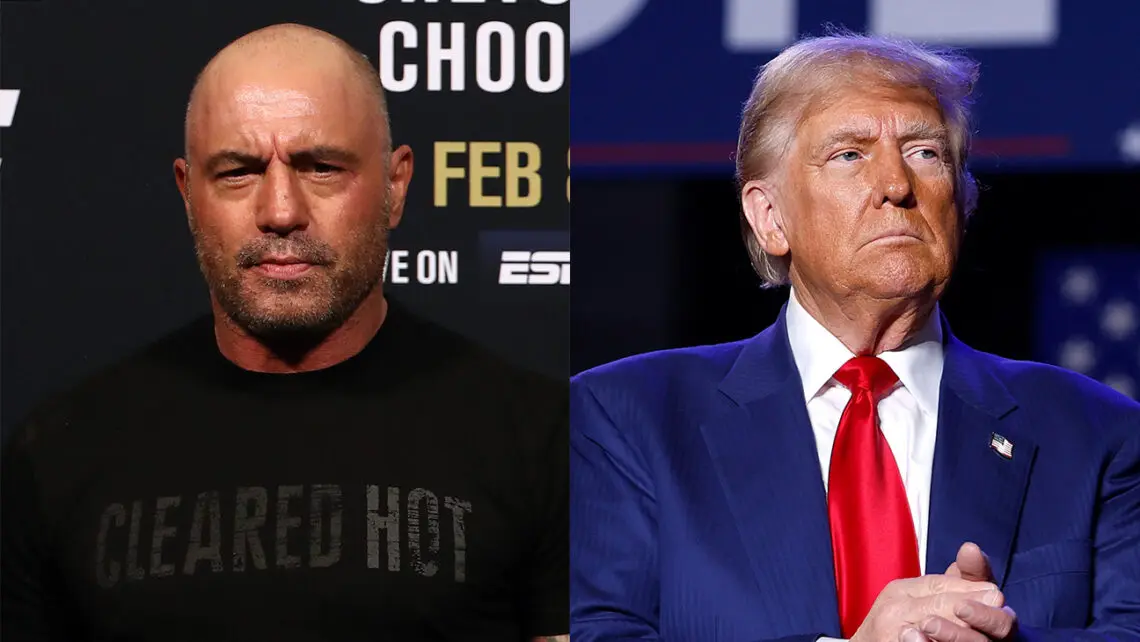Trump tackles controversies on Joe Rogan Experience podcast
A revisit to key political and cultural debates
In a much-anticipated appearance on the immensely popular Joe Rogan Experience podcast, former president and 2024 GOP nominee, Donald Trump did not hold back, diving into cultural and political issues he has been known to address controversially in recent years. During the extended conversation, Trump revisited several controversial topics, including the ongoing Ukraine conflict and the 2020 election, which he once again claimed was “stolen” from him.
Claims about the Ukraine conflict and moderator biases
Among the many claims Trump made during the podcast, one particularly striking statement was his assertion that the Ukraine war would not have happened under his presidency. This viewpoint has been a recurring theme in his speeches, as he positions himself as a decisive leader capable of averting international conflicts.
Additionally, Trump criticized moderator performances during his one and only debate with Vice President Kamala Harris, suggesting that there was insufficient fact-checking. This criticism is not new, as Trump has frequently questioned the impartiality of the media and debate moderators throughout his political career.
The ongoing election debate
A significant portion of the three-hour conversation centered on Trump’s repeated assertions that the 2020 election was rigged. Despite numerous investigations and court cases affirming the election’s integrity, Trump insisted that certain changes in election laws were not properly authorized, suggesting widespread voter fraud as a result.
“That election was so crooked, it was the most crooked election,” Trump stated, as Rogan pressed for concrete examples.
Trump’s explanation was convoluted, involving claims of unapproved legislative changes and unspecified voting irregularities. For instance, he alleged that in Wisconsin, access to certain ballots was denied because they weren’t signed or original.
“You don’t have to go any further than that,” Trump said. “They virtually admitted that the election was rigged, robbed, and stolen.”
Joe Rogan, maintaining his role as a critical interviewer, asked for specific evidence on several occasions. Trump’s response was often vague, and at times, he seemed to contradict himself, admitting he lost the election before correcting his statement.
“I lost by like… I didn’t lose, but they say I lost, Joe,” Trump conceded, reflecting on his defeat by a narrow margin of 22,000 votes.
A calculated move to engage younger male voters
Trump’s appearance on Rogan’s podcast, aired across platforms including Apple Podcasts and YouTube, signifies a strategic shift in his campaign to appeal to a younger, predominantly male audience. Rogan’s show, which recently expanded from its exclusive Spotify availability, enjoys a vast and loyal listener base, with about 81% of the audience being male and over half under 35 years old.
Kamala Harris, too, has been exploring non-traditional media spaces to connect with voters, appearing on shows like Call Her Daddy and Howard Stern’s Sirius XM show. These appearances reflect a broader trend where political candidates are increasingly leveraging popular podcast platforms to reach diverse audiences.
The Joe Rogan and Robert Kennedy Jr. controversy
Rogan has not been without his controversies. Recently, he made comments interpreted by some as endorsing independent presidential candidate Robert Kennedy Jr. This sparked backlash among Trump supporters, leading Trump to comment on his Truth Social platform, speculating on Rogan’s reception at future UFC events.
Rogan quickly clarified that his remarks were not an endorsement, but the incident highlights the podcast’s influential role in shaping political discourse.
The broader context of political podcasts
Before appearing on the Joe Rogan Experience, Trump had engaged with other popular podcasts such as This Week w/ Theo Vaughn and Full Send. Harris mirrored this strategy with her visits to broader-reaching programs. These appearances signify a notable shift towards non-traditional media, as both candidates seek to diversify their outreach in the remaining months of their campaigns.
Interestingly, polling indicates that despite their efforts, only a small fraction of the adult populace has engaged with these podcast appearances, suggesting that the impact may not be as significant as hoped.
In addition to his podcast endeavors, Rogan continues his role as a commentator for the Ultimate Fighting Championship (UFC), a space where Trump maintains significant influence thanks to his close relationship with UFC President Dana White.
Trump’s ties with White were particularly visible when White spoke in support of Trump at a major event, underscoring the candidate’s influence within the sports entertainment domain.
With the intensifying political landscape, Trump’s appearance on Rogan’s podcast underscores the evolving nature of campaign strategies and the growing importance of alternative media platforms.
Share your thoughts on these developments and stay tuned for more detailed analyses of the shifting dynamics in political campaigning.

 Italian
Italian







